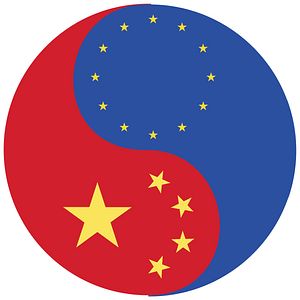Since last Sunday, Chinese President Xi Jinping has been traveling in Europe. He held a state visit in the Netherlands in advance of the Nuclear Security Summit in The Hague. After the NSS, Xi moved on to the rest of his Europe tour, with stops in France, Germany, and Belgium (where he will visit the European Union headquarters in Brussels). In total, Xi will spend nine full days in Europe.
The trip was Xi’s first presidential visit to Europe and reflected a new Chinese determination to actively cultivate ties with European countries. Despite much talk during his tour of close, long-standing friendships with European nations, it had been eight years since the last state visit by a Chinese president to Germany, and four years since Hu Jintao’s last state visit to France. No Chinese president had ever paid a state visit to the Netherlands.
As with many Chinese diplomatic visits, the major focus was on trade. During Xi’s meeting with Dutch Prime Minister Mark Rutte, Xi expressed his hope that China and the Netherlands can increase their agricultural cooperation, especially by upping dairy exports from the Netherlands to China. Xi and French President François Hollande signed economic deals worth 18 billion euros ($24.76 billion), including a formal partnership between Chinese automotive company Dongfeng and France’s PSA Peugeot Citroen and an order of 70 new aircraft from the French company Airbus. China and Germany signed their own set of business deals to mark Xi’s visit, including an agreement between Deutsche Boerse and Bank of China. According to Reuters, that deal is expected to make it much easier for European investors to make transactions involving the renminbi.
Trade relations were especially important during Xi’s visit to Germany, which accounts for one-third of China’s total trade with the European Union. An article by Xi drew attention to China and Germany’s status as “economic miracle creators.” Xi also highlighted the potential benefits of broader economic cooperation between the two nations: “There is no doubt that China’s market and Germany’s technologies, when working together, will greatly facilitate the economic growth and social development in China and Europe and bring many benefits to ordinary people.”
For the most part, Xi focused on what China has to offer European markets. A commentary in Xinhua proclaimed that trade deals signed during Xi’s visit “will help Germany better stave off the fall-out of Europe’s most devastating financial turmoils in recent memory.” However, it was also clear what China hopes to get out of its increased diplomatic attention to Europe: smoother trade relations with the EU as a whole. During each of his stops, Xi told his European counterparts that he hoped their countries would do more to help China improve its relations with the EU.
Xi especially stressed China’s desire to see a China-EU investment treaty, negotiations for which began in January, come to fruition. Xi and other Chinese leaders have also expressed hope for progress towards an eventual free-trade agreement between China and the EU. More short-term, however, Xi asked his counterparts to help smooth over trade disputes, which have been a recent source of friction between China and Europe.
In a broader sense, Xi’s trip to Europe, especially the economic component, fits in with China’s general foreign policy strategy of increasing economic integration worldwide. In his essay for German readers, Xi said he hopes that China-Germany cooperation will lead to the “formation of a big Asia-Europe market”—presumably, with China as a major hub in this new market. China’s stepped-up involvement in Central and Eastern Europe, as well as its plans for a “Silk Road Economic Belt” also speak to this ambition.
However, given the timing of Xi’s visit, it was inevitable that the Ukraine crisis would detract somewhat from the focus on trade. European leaders in France and Germany took the opportunity of Xi’s visit to press him for stronger support for the Western position on Ukraine. Xi, however, stood firm in reiterating China’s official line of seeking dialogue and political settlement of the issue, while not expressing either support for or disapproval of the recent referendum in Crimea. For now, China is trying to keep its political differences with the West from interfering with closer trade relations with the EU.

































